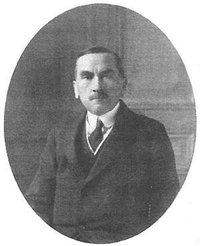Roman Dmowski
|
|
Roman Dmowski (b. August 9, 1864, Warsaw - d. January 2, 1939, Drozdowo, Poland) was a Polish right-wing politician and statesman, and chief ideologue and co-founder of the National Democratic Party (Endecja).
Biography
As a student, he became active in the "Zet" Polish Youth Association (Zwiazek Mlodziezy Polskiej "Zet"). He organized a student street demonstration on the 100th anniversary of the Polish Constitution of May 3, 1791. For this he was imprisoned by the Russian Tsarist authorities for half a year at the Warsaw Citadel.
Later he headed the National League (Liga Narodowa). In 1895 he settled in Lemberg, Austria-Hungary (known as Lwów to the Poles), and in 1897 co-founded the National-Democratic Party (Stronnictwo Narodowo-Demokratyczne or Endecja). A brilliant chemist, his scientific accomplishments brought him much prestige within the Polish community. In 1898-1900 he resided in France and Britain. In the face of a growing threat from Germany, he declared for tactical Polish cooperation with Tsarist Russia and brought about a similar reorientation in the whole organization (the faction opposed to the new policy split away). In 1901 he returned to Austrian Poland, taking up residence in Krakow.
Upon the outbreak of the Russo-Japanese War (1904-5) Dmowski traveled to Japan in a successful effort to prevent that country from providing Jozef Pilsudski with assistance for an insurrection in Poland, which Dmowski felt was doomed to failure.
In 1905 Dmowski moved to Warsaw in Russian Poland. He was a deputy to the Second and Third Russian Dumas and president of the Polish club. Before 1914, Dmowski was prepared to settle for Polish autonomy within the Russian Empire. A staunch Germanophobe, he believed that any independent Poland would swiftly fall to German imperalism. In light of the German threat, Dmowski felt that a strong Russia was Poland's best protection. Dmowski's great rival Jozef Pilsudski held the opposite view and argued that Russia was greater threat to the Poles then either Germany or Austria-Hungary.
In 1915 he went abroad to open a campaign on behalf of Poland in the capitals of the western Allies. As part of his lobbying campaign, Dmowski befriended opinion-makers such as the British journalist Wickham Steed. In 1917, in Paris, he created a Polish National Committee aimed at rebuilding a Polish state. He was a Polish delegate at the Paris Peace Conference and a signer of the Versailles Treaty. He had a substantial influence on the Treaty's favorable decisions regarding Poland.
Dmowski was a political opponent of Jozef Pilsudski. He favored a national state, most of whose citizens would speak Polish and be of the Catholic faith. He was accused of antisemitism, though he is quoted as saying that "A Poland without Jews would be like a soup without pepper: tasteless." If Pilsudski's vision of Poland was the Jagiellonian one of a multinational federation (Miedzymorze federation), Dmowski's vision was the earlier Piast one of an ethnically homogeneous and nationalistic state. Pilsudski belived in wide definition of Polish citizenship in which peoples of different languages, cultures and faiths were to be united by a common loyalty to the reborn Polish state. Dmowski regarded Pilsudski's views as dangerous pie-in-the-sky nonsense, and felt that only those of Polish language and culture and the Roman Catholic religion were true Poles. For Dmowski, the idea of minority rights was an anathema, and at the Paris peace conference, he argued strenuously against the Minority Rights treaty the Allies forced on Poland.
Dmowski was a Social Darwinist, a Germanophobe and anti-semitic who saw life as zero-sum game in which any gain made by one group automatically came at the expense of another. For Dmowski, one of Poland's principal problems was that not enough Polish-speaking Catholics were middle class and too many ethnic Germans and Jews were middle class. To remedy this perceived problem, he favored a policy of confiscating the wealth of the Jews and ethnic Germans and redistributing it to Polish Catholics. Dmowski was never able to have this program passed into law by the Sejm, but the National Democrats did frequently organize "Buy Polish" boycott campaigns against Jewish shops.
Dmowski was a deputy to the 1919 Sejm and minister of foreign affairs from October to December 1923. When it came to time to writihg the Polish constitution in the early 1920s, the National Democrats insisted upon a weak presidency and strong legislative branch. Dmowski was convinced that Pilsudski would run for and win the presidency, and as such, Dmowski saw a weak presidency as the best way of crippling his rival. The constitution when it was finally passed in 1922, did have a weak executive branch and a disgusted Pilsudski refused to seek office.
In 1926 he founded the Camp of Great Poland (Obóz Wielkiej Polski), and in 1928 the National Party (Stronnictwo Narodowe).
Dmowski died at the beginning of 1939 in Drozdowo, near Łomża, where he had spent the last few years of his life. He never married.
Chief writings
- Mysli nowoczesnego Polaka (Thoughts of a Modern Pole), 1902.
- Niemcy, Rosja a sprawa polska (Germany, Russia and the Polish Cause), 1908.
- Upadek mysli konserwatywnej w Polsce (The Decline of Conservative Thought in Poland), 1914.
- Polityka polska i odbudowanie panstwa (Polish Politics and the Rebuilding of the State), 1925.
See also
Template:Ministers of Foreign Affairs of Polandde:Roman Dmowski pl:Roman Dmowski

